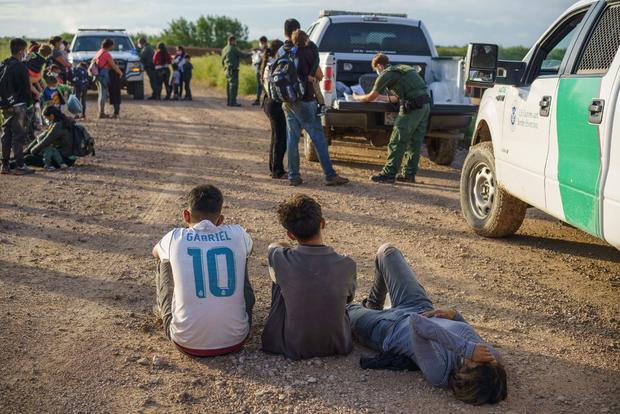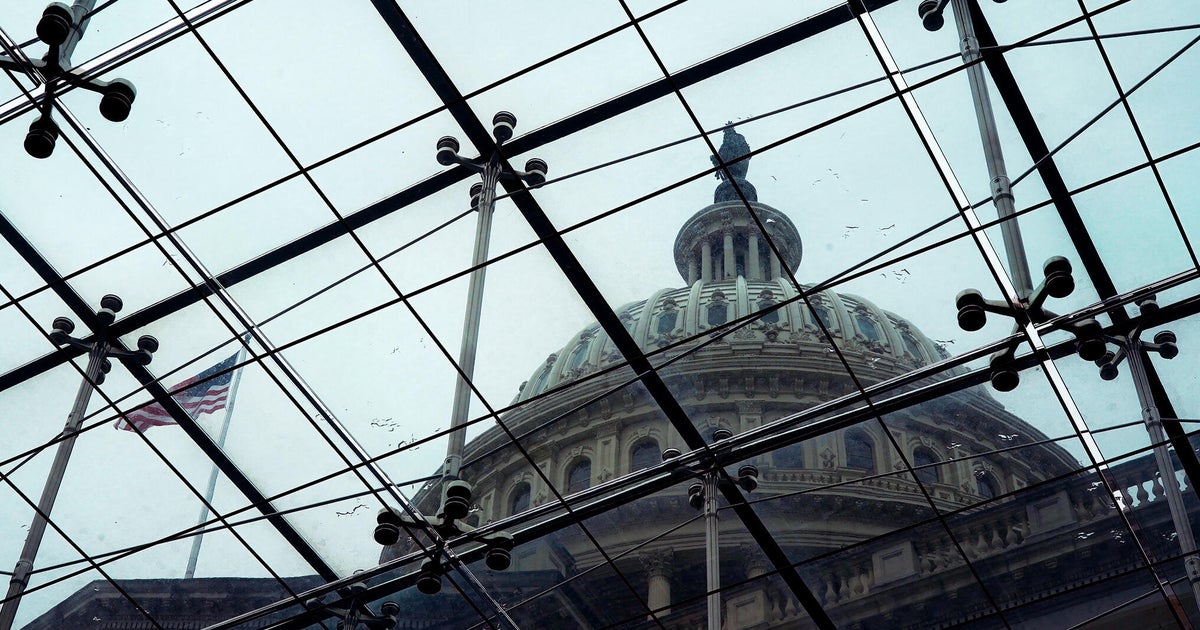Division among Biden appointees led U.S. to embrace Trump-era border policies
In early July, the Department of Homeland Security (DHS) drafted a comprehensive nine-page plan to stop using a Trump-era pandemic policy to rapidly expel migrant families with children, according to internal government documents obtained by CBS News.
But the plan was shelved after senior White House and DHS officials expressed concern about the risks of unwinding the expulsion policy, known as Title 42, when arrests of migrants had spiked to a 21-year high and the Delta variant of the coronavirus was spreading rapidly.
Instead, the Biden administration issued its own order defending the use of Title 42, which was first invoked by the Trump administration in March 2020 over the objections of some Centers for Disease Control and Prevention officials. Since July, U.S. immigration officials have used Title 42 to expel more than 44,000 migrant parents and children traveling as families without allowing them to request humanitarian protection.
"We are in this very weird place where we're implementing Title 42 more strongly than the Trump administration did," a Biden appointee who requested anonymity to speak freely told CBS News.
The internal split around Title 42 is part of broader divisions within the Biden administration over border policy that have boiled over amid record numbers of migrant apprehensions, four people with direct knowledge of the infighting told CBS News.
Some administration officials "don't want to see folks ever removed," another Biden appointee said. "That's not where President Biden is. That's not where the mainstream Democratic Party is."
The disagreements between some of President's Biden appointees who have pushed for tougher enforcement, including increased deportations, and others who support expanding access to the asylum system have hindered the administration's policy objectives, the people involved in the discussions said.
"From the very beginning, there have been battles within the administration about how to handle the border between those who are more progressive and those who are more enforcement-minded on the issue," one person said. "These battles have led to paralysis, which has allowed things to get worse in several ways."
"We're not making any progress," said another person with direct knowledge of the disagreements, citing "so much division" among Mr. Biden's appointees.
Starting later this month, the Biden administration could find itself implementing the most sweeping border restrictions instituted under former President Donald Trump: the Title 42 expulsions and a program that requires asylum-seekers to wait in Mexico while their cases are reviewed by U.S. courts.
"Politics trumps policy"
Susan Rice, Mr. Biden's top domestic policy adviser, and other senior officials have argued Title 42 is needed to protect border communities from COVID-19, avert mass releases of migrant adults and lessen the political pressure from high levels of border arrests, three people familiar with the deliberations said.
But other Biden appointees believe the continued implementation of Title 42 is largely based on optics — that it's staying in place because of concerns that ending it will fuel perceptions of a chaotic border.
"At the end of the day, politics trumps policy. And the politics of having high numbers at the border is what has won out," one Biden appointee familiar with the infighting said.
Under the internal July plan to wind down Title 42, all migrant families would be screened for asylum or placed in expedited deportation proceedings. Officials proposed obtaining more ankle bracelets to monitor families released from U.S. custody and offering COVID-19 vaccines to all adult family members, which has yet to occur.
Given the crises facing Haiti, some Biden appointees were horrified by the decision to expel 8,000 Haitians after thousands of migrants arrived in Del Rio, Texas, in September. But senior officials, including Rice and Ron Klain, Mr. Biden's chief of staff, greenlighted the deportation blitz, believing it would deter other Haitians from coming, people familiar with the matter said.
An August court order requires the administration to reinstate the Trump-era Remain in Mexico program, a prospect that has alarmed advocates, who say the program made asylum-seekers easy prey for kidnappers and violent cartels.
But Biden appointees at DHS and the National Security Council had already proposed reviving the policy months earlier, in the spring, according to four people familiar with the plan.
Reviving Remain in Mexico, the people said, was presented as a deterrence tool. Some officials believed the policy could be applied in a way that afforded greater due process and safety to asylum seekers — changes the Biden administration has said it is currently working on.
But other officials opposed reinstating a policy that Mr. Biden himself had denounced as inhumane. "Because it had been a tool that was misused by Trump, the opportunity to try to improve it was not going to be politically viable," one Biden appointee said.
Still, the program's reinstatement was again considered at a high level over the summer, when border arrests skyrocketed.
The administration last Friday issued a memo to try to end the Remain in Mexico a second time — but it won't take effect unless the August ruling is lifted. In his memo, Secretary of Homeland Security Alejandro Mayorkas condemned the policy's "unjustifiable human costs."
"This administration got hammered because of the numbers. If they put in place a policy that lowers the numbers, I think it's going to be really hard to roll it back," another Biden appointee said of Remain in Mexico.
Biden administration officials have battled over other border policies, including a proposal to expel older unaccompanied teenagers when a record number of migrant children entered U.S. custody without their parents earlier this year. That plan was eventually scrapped after some officials expressed concerns about its legality, two people involved in the deliberations said.
During the Trump administration, U.S. border officials used Title 42 to expel 15,000 unaccompanied migrant minors before a federal judge barred the practice in November 2020. Shortly after Mr. Biden took office, the U.S. exempted unaccompanied children from the expulsions.
The Biden administration has also considered trying to convince the Mexican government to sign a "safe-third-country" agreement that would allow the U.S. to reroute non-Mexican asylum-seekers to Mexico with instructions to seek refuge there, according to four people with knowledge of the proposal.
In 2019, Mexico rejected such an asylum agreement when it was proposed by the Trump administration, which later brokered similar deals with Guatemala, Honduras and El Salvador. In February, the Biden administration voided those agreements.
Two people involved in the administration's planning said top White House officials have repeatedly expressed concern about creating "pull factors" that encourage migrants to enter the U.S. illegally. In one internal document, officials said offering vaccines to migrants could be "a draw to crossing the border."
Tyler Moran, Mr. Biden's senior adviser for migration, said she disagrees with the notion that infighting has stalled the administration's agenda. "Immigration is extremely complicated. There's no quick fix. Nothing is easy," Moran told CBS News during an interview on Friday.
Moran said the Biden administration is not just focused on deterring migrants, noting it has been working to expand refugee resettlement and work visas and to mitigate the factors that push people to leave their home countries. Title 42 is not being used as an "immigration enforcement tool," Moran said.
The administration, Moran added, is still trying to rebuild an asylum system gutted by Trump-era limits. It also has to move carefully to make sure policy changes withstand lawsuits.
"There are policies that we have put in place and are working to implement that are priorities of the advocacy community," Moran said. "We are aligned on the long-term vision of a more humane immigration system, but people need to understand it's going to take some time to get there and do it right."
In a statement, DHS spokeswoman Marsha Espinosa said the department respects and encourages "differences of opinion," calling them "a hallmark of good ideas and good government."
"Terrible options"
For some Biden appointees, the ongoing Title 42 expulsions and the planned revival of Remain in Mexico mean the administration has failed to implement its own border policy vision.
"We need a more functional system. It has to work or else we're just going to keep making people as humanely miserable as possible, which I don't believe the president wants," one appointee said. "I don't know why toughness has to be visible human suffering."
But other Biden officials believe the current situation was fueled by a convergence of stark policy differences and a record number of migrant arrests. For them, progressive advocates have been making unreasonable demands that would, if implemented, create an untenable border situation, practically and politically.
"The advocacy groups have not made things easy on the administration," one person said. "The only policies they support are those in which every person who crosses the border is released into the country with cases that will take years to get to, if the government can get to them at all. That is not functional, or sustainable."
The relationship between the Biden administration and the immigrant advocacy community has recently deteriorated, with advocates staging a "walk out" during a virtual meeting with top immigration officials in mid-October. Advocates said they don't expect that relationship to heal any time soon.
"The asylum system needs to be restored," said Astrid Dominguez, an immigration advocate who oversees a coalition of advocacy groups in south Texas. "These are not Trump policies; these are Biden policies at this point."
Cecilia Muñoz, who served as the top immigration adviser to former President Barack Obama, said she understands some of the advocates' frustration. But she said the Biden administration has "terrible options," noting that sending migrants to Mexico, detaining them or releasing them into the U.S. all have humanitarian and political consequences.
"Some advocates have not grappled with the difference, if any, between their position and an open-borders position. And an open-borders position is anathema in the country," Muñoz, who also served on Mr. Biden's transition team, told CBS News. "It's like pushing the administration right off a cliff."
There's some agreement within the administration, among progressives and moderates alike, that the ideal border policy would center on a rule that would allow asylum officers, instead of the backlogged immigration courts, to adjudicate claims. Asylum-seekers would be screened for U.S. protection at campus-like processing centers, while migrants fleeing economic hardship would be deported under the "expedited removal" process.
But there are currently no signs that such a system will be put in place any time soon.







